I get the strategy, but Mitch McConnell’s lament reminds one of the old joke about negotiating a sexual encounter after an initial offer of a fortune. We all know now what the Senate Republicans are on spending, right? All this amounts to after McConnell’s own aye vote on the $1.2 trillion infrastructure bill is haggling over the later $3.5 trillion price, no?
Senate Democrats are about to take their first step toward yet another reckless, partisan taxing and spending spree.
It will push costs even higher for families. It will shatter President Biden’s promise of no middle-class tax hikes.
Long day of debate and voting ahead.
— Leader McConnell (@LeaderMcConnell) August 10, 2021
McConnell is hardly alone in this complicity. His caucus provided 19 votes to pass the bipartisan Phase 1 bill on infrastructure, even though the CBO scored it as a significant increase to deficit spending outside of the normal budget over the next decade. Here’s the Senate GOP score on the bill:
Here are the 19 Republican Senators who voted YES on the bipartisan infrastructure bill:
Blunt
Burr
Capito
Cassidy
Collins
Cramer
Crapo
Fischer
Graham
Grassley
Hoeven
McConnell
Murkowski
Portman
Risch
Romney
Sullivan
Tillis
Wicker— Frank Thorp V (@frankthorp) August 10, 2021
This isn’t necessarily a slam dunk for passage. Nancy Pelosi has claimed that she won’t move this bill until she gets a fully passed reconciliation bill on the rest of the progressive wish list. Just how far she’ll go in refusing to move the only other Biden administration legislative win so far (the COVID-19 relief bill in March under reconciliation being the first) remains to be seen. It’s going to be very tough to block $1.2 trillion in spending after venting for the last few months about the emergency of infrastructure investment.
Plus, Democrats seem to be doing their level best to talk their way out of a reconciliation win on the bill. Here’s Ed Markey arguing that the reconciliation bill is just a crypto effort to impose the Green New Deal, which will be news to voters in places like West Virginia, Montana, and maybe even Arizona and Georgia:
Democrat Senator Ed Markey: “the Green New Deal is in the DNA” of the Democrats’ reckless $3.5 trillion spending spree pic.twitter.com/vkEYUYuIMa
— RNC Research (@RNCResearch) August 10, 2021
Senate Democrats have to defend seats in Georgia and Arizona next year. This kind of overreach, especially under bare-knuckled partisan maneuvering in service to a radical agenda, will not play well in states where Democrats barely got over the line in the first place. In fact, it might end up costing them a lot more than they project, just as their ObamaCare project cost them control of the House and nearly the Senate in the 2010 midterms.
Anyway, back to McConnell’s strategy, which is sound if still cynical. First, it’s clear that plenty of Republicans in both the House and Senate wanted to spend a lot of money on infrastructure, including McConnell. They got at least some pay-fors by collaborating with Democrats, even if those came up short. That’s still an improvement … of sorts, anyway.
There’s a bigger strategy than that in play, however. By throwing in with this package — which would have easily cleared cloture anyway — McConnell’s making an argument that Republicans aren’t the party of No. If the Democrats’ agenda can’t get through an evenly split Senate, it’s not because of the filibuster, but because of the radical nature of the Senate. Guy Benson hits the nail on the head:
I have deeply mixed feelings about this bill, especially after the CBO score. But this result does deal a major, substantive blow to progressives’ repeated claim that Republicans never negotiate in good faith, so Dems shouldn’t bother — and should instead nuke the filibuster. https://t.co/3jp2xCb5zr
— Guy Benson (@guypbenson) August 10, 2021
Will that completely negate the filibuster-repeal talk? Not at all, but this does strengthen Joe Manchin and Kyrsten Sinema and pay them back for their firm opposition to that idea. That might also help Manchin peel away from the reconciliation package in the end, although one has to assume that Sinema would be more inclined to go along with a slightly smaller package than the bloated cheeseburger Schumer just dropped on the Senate.
In other words, Republicans just paid a trillion dollars to protect the filibuster. That’s an understandable trade for McConnell, but for that price, it had better be safe for a lot longer than ten years.








Join the conversation as a VIP Member